- Home
- Cormac McCarthy
The Crossing tbt-2 Page 22
The Crossing tbt-2 Read online
Page 22
No. She did.
He nodded. They ate.
How bad are you cut? Boyd said.
It's just a scratch. He cut through my boot pretty good.
This country's hell on clothes.
It's gettin that reputation with me. What possessed you to run their horses off thataway?
I dont know. I just took a notion to do it.
Did you hear what he said about her?
Yeah. I heard it.
By sunup they'd broke camp and were set out once more across the gravel and creosote plain south. They nooned at a well in the desert where oak and elder grew clumped in the flats and they turned the horses out and slept on the ground. Billy slept with the shotgun cradled in his arm and when he woke the girl was sitting watching him. He asked her if she could ride caballo en pelo and she said that she could. When they set out again she rode behind Boyd so as to spell the horses. He thought Boyd would have something to say about it but he didnt. When he looked back the girl was riding with both arms around his waist. When heaEU'looked back later her dark hair was spilled over his brother's shoulder and she was sleeping against his back.
In the evening they reached the hacienda of San Diego sited on a hill overlooking the tilled lands that ran on to the Casas Grandes River and to the Piedras Verdes. A windmill turned on the plain below them like a Chinese toy and dogs barked in the distance. In the long steep light the raw umber mountains stood deeply shadowed in their folds and in the sky to the south a dozen buzzards turned in a slow crepe carousel.
III
IT WAS ALL BUT DARK when they rode past the main house and along the drive, past the porticoes with their slender carved iron posts, past the white plaster walls quoined with red sandstone blocks and the terracotta filigree along the upper parapets. The front of the house was faced with three stone arches and above them were carved the words Hacienda de San Diego in letters arched over the initials L. T. The tall Palladian windows were shuttered and the shutters were weathered and broken and paint and plaster were flaking from the walls and the portico ceiling was no more than bare wood lath all waterstained and buckled. They went on across the yard toward what looked to be the domicilios where smoke was rising against the evening sky and rode through the standing wooden gates into the courtyard and sat the horses side by side.
In one corner of the enclosure stood the carcass of an antique Dodge touring car long stripped of wheels and axles, of glass and seats. At the far end of the compound a cookfire burned on the ground and by its light they could see two gaudy caravan wagons with wash hung between them and passing back and forth before the fire both men and women in robes and kimonos who appeared to belong to a circus.
Que clase de lugar es este? Billy said.
Es ejido, said the girl.
Que clase de gente?
No to se.
He swung down and the girl slid from the back of Boyd's horse and came and took the reins.
What are them? said Boyd.
I dont know.
They entered the compound, Billy and the girl afoot, the girl leading the horse. Boyd rode behind them. The figures at the far end paid them no mind at all. Two boys were lighting lamps from a burning split of wood at the fire and passing the lit lamps by their bails on a forked pole to a boy on the azotea who moved against the deepening sky hanging the lamps from the parapet. The ground in the compound became more illuminated as he went and soon a rooster began to call. Other boys were stacking haybales against a wall and under the farther portal men were unrolling a painted canvas drop much cracked and weathered from its travels.
Two of the costumed figures seemed engaged in a controversy and one of them stepped back and flung his arms wide. As if to demonstrate the measure of something outsized. Then he burst into song in some alien tongue. All movement ceased until he had done. Then all began again.
Donde estan los domicilios? said Billy.
The girl nodded toward the dark beyond the walls. Afuera, she said.
Let's go.
I'd like to see it, Boyd said.
You dont even know what it is.
It's somethin.
Billy took the bridlereins from the girl. He looked back at the fire, at the figures there. We can come back, he said. They're just gettin set up.
They rode out to where the three long adobe buildings stood that housed the workers and they rode up the passageway between the first two paced the way by a gauntlet of bristling and snarling curdogs. The evening was warm and there were cookfires burning out of doors and in the soft light a muted clink of utensils and the delicate slapping of hands shaping out tortillas. People drifted from fire to fire and their voices carried on the darkness and more distantly yet the sound of a guitar on the sweetness of the summer night.
They were given rooms at the far end of the row and the girl unsaddled Billy's horse and led both animals off to water them. Billy fished a wooden match from his shirtpocket and struck it alight with his thumbnail. The two rooms had a single door and a single window and high ceilings of vigas with latillas of sticks. A low door connected them and in the corner of the second room was a fireplace and a small altar with a Virgin of painted wood. A jar that held dead weeds. A drinking glass in the bottom of which lay a medallion of blackened wax. Against the wall stood a contrivance of poles lashed together into a frame and webbed with strips of rawhide with the hair on. It had the look of some rude agrarian implement but was in fact a bed. He blew out the match and walked out and stood in the door. Boyd was sitting on the stoop watching the girl. She was at the watering trough at the far end of the compound holding the horses while they drank. She and the two horses and the dog were surrounded by a semicircle of sitting dogs of every stripe and color but she paid them no mind. She stood very patiently with the horses while they drank. While they raised their dripping mouths and looked about and while they drank again. She did not touch the horses nor talk to them. She just waited while they drank and they drank for a long time.
They ate with a family named Mufioz. They must have looked hard used by the road for the woman kept urging food upon them and the man made little lifting motions with his outheld hands that they take more. He asked Billy where it was that they had come from and received the news with a certain sadness or resignation. As of things that could not be helped. They ate squatting on the ground with spoons and clay plates. The girl offered nothing in the way of her own origins and no one asked. While they were eating a strong tenor voice came floating on the night over the roofs of the domicilios. It ran up the scales and down twice in succession. Silence fell over the camp. A dog began to howl. Only after it seemed there would be nothing more forthcoming did the ejiditarios commence to talk again. A little later a bell tolled from somewhere off in the compound and in the long afterclang they began to rise and call out to one another.
The woman had carried her corral and her pots to the house and she now stood in the lamplit doorway with a small child on one arm. She saw Billy still sitting on the ground and she motioned him up. Vamonos, she called. He looked up at her. He said that he had no money but she only stared at him as if she did not understand. Then she said that everyone was going and that those who had money would pay for those who did not. She said that everyone must go. There could be no thought of people being left behind. Who would permit such a thing?
He rose and stood. He looked for Boyd but he could not see him or the girl. Stragglers were hurrying through the smoke of the dying cookfires. The woman had shifted the child to her other hip and come forward and took him by the hand as if he were himself a child. Vamonos, she said. Esta bien.
They followed the others up the hill, the crowd moving slowly for the old people and the old people urging them to pass and go on. None would. The empty house on the crest of the rise above them stood bleak and lightless but music was coming from the long walled compound where the shops and establos were once sited, the domiciles of the overseers. Light fell out through the tall bay doors and cressets of oil o
r pitch fashioned out of buckets burned at either side of the stone archway at the entrance and here the ejiditarios were queued and they shuffled forward with their centavos and their pesos clutched in their hands to offer them up to the doorman where he stood in his polished black suit. Two young men carrying a litter passed through the crowd. The litter was made from poles and sheeting and the old man lying on it was dressed in coat and tie and he clutched a wooden rosary and stared grimly at the arch of sky above him. Billy looked at the child the woman was carrying but the child was asleep. When they reached the gates the woman paid and the gatekeeper thanked her and rattled the coppers into a bucket on the ground beside him and they passed through into the courtyard.
The gaudy little wagons had been drawn up at the farther end of the enclosure. Lamps stood in a semicircle on the packed clay ground before them and lamps had been hung from a rope stretched overhead and in the uptight overhead the faces of young boys watched along the parapet like rows of theatrical masks displayed there. The mules that stood between the wagonshafts were fitted out in braid and tinsel and velvet trappings and the mules and caravans alike were the same that conveyed the little company over the back roads of the republic to stand at night in just these costumes while the lamps were lit and the crowds pushed forward in some backland plaza or alameda where a man passed up and back and swung before him like a censer a waterpail pierced with nailholes by which to lay the dust and the primadonna moved in lascivious silhouette behind a wagonsheet donning her costume or turning to regard herself in a mirror which none could see but all could imagine to be present.
He watched the play with interest but could make little of it. The company was perhaps describing some adventure of their own in their travels and they sang into each other's faces and wept and in the end the man in buffoon's motley slew the woman and slew another man perhaps his rival with a dagger and young boys ran forward with the curtain hems to draw them shut and the mules standing in their traces raised their heads up out of their sleep and began to shift and step.
There was no applause. The crowd sat quietly on the ground. Some of the women were crying. After a while the majordomo who had spoken to them prior to the performance stepped out through the curtain and thanked them for their attendance and stepped to one side and bowed as the boys carried the curtains open again. The actors stood before them hand in hand and bowed and curtseyed and there was a smattering of applause and then the curtain closed for good.
In the morning before it was quite light he walked out of the compound and down to the river. He walked out over the plank bridge on its stone piers and stood looking down at the clear cold waters of the Casas Grandes running out of the mountains to the south. He turned and looked downstream. A hundred feet away in water to her thighs stood the primadonna naked. Her hair was down and it was wet and clinging to her back and it reached to the water. He stood frozen. She turned and swung her hair before her and bent and lowered it into the river. Her breasts swung above the water. He took off his hat and stood with his heart laboring under his shirt. She raised up and gath?ered her hair and twisted out the water. Her skin so white. The dark hair under her belly almost an indelicacy.
She bent once more and trailed her hair in the water with a swaying motion sideways and then stood and swung it about her in a great hoop of spray and stood with her head back and her eyes closed. The sun rising over the gray ranges to the east lit the upper air. She held one hand up. She moved her body, she swept both hands before her. She bent and caught her falling hair in her arms and held it and she passed one hand over the surface of the water as if to bless it and he watched and as he watched he saw that the world which had always been before him everywhere had been veiled from his sight. She turned and he thought she might sing to the sun. She opened her eyes and saw him there on the bridge and she turned her back and walked slowly up out of the river and was lost to his view among the pale standing trunks of the cottonwoods and the sun rose and the river ran as before but nothing was the same nor did he think it ever would be.
He walked slowly back up to the compound. In the new sunrise the shadows of workers setting out for the fields with their shouldered hoes passed one by one along the eastern facing wall of the granary like figures in some agrarian drama. He got his breakfast from the Mufioz woman and walked out with his saddle over his shoulder and caught his horse and saddled him and mounted up and rode out to see the country.
It was midday before the caravans bearing the opera company sallied forth out through the gates and down the hill and across the bridge to set out south along the road to Mata Ortiz, to Las Varas and Babicora. In the hard noon light the faded gilt of the lettering and the weathered red paint and sunbleached tapestries seemed some fallen grace from the pageantry of the prior night and the caravans in their trundling and swaying slowly south and in their diminishing in the heat and desolation seemed charged with some new and more austere enterprise. As if the light of God's day had sobered their hopes. As if the light and the country thereby made visible were alien to their true purpose. He watched from a rise in the rolling lands south of the hacienda where the grass seethed in the wind underfoot. The caravans moved slowly through the cottonwoods on the far side of the river, the little mules plodded. He leaned and spat and put the horse forward with his heels.
In the afternoon he walked through the empty rooms of the old residencia. The rooms were stripped of their fixtures and chandeliers and the parquet flooring was mostly gone. Turkeys stepped and moved away through the rooms before him. The house smelled of damp and old straw and waterstains had wrought upon the swagged and crumbling plasterwork great freeform sepia maps as of old antique kingdoms, ancient worlds. In the corner of the parlor a dead animal, dry hide and bones. A dog perhaps. He walked out into the courtyard. The raw mud brickwork showing through the plaster of the enclosing walls. In the center of the open space a stonework well. A bell rang in the distance.
In the evening the men smoked and talked and drifted in small groups from fire to fire. The Mufioz woman brought his boot to him and he examined it in the firelight. The long slice in the leather had been mended back with awl and cord. He thanked her and pulled it on. The women knelt on the packed dirt and leaned over the coals and turned with their bare hands the tortillas off the hot sheetiron comals leaving along the unleav?ened edges like tallymarks fingerprints of black from where they'd fed the charcoal fire. An endless ritual endlessly repeated, the propagation of the great secular host of the Mexicans. The girl helped the woman prepare the meal and after the men had been fed she came and sat beside Boyd and ate in silence. Boyd seemed to pay her little mind. He'd told Boyd that they'd be leaving in two days' time and in the way she raised her eyes to look at him across the fire he knew that Boyd had told her.
She worked all the day following in the fields and in the evening she came in and went to wash herself with bowl and rag behind the curtain and then went out to sit and watch small boys playing ball in the clay court between the buildings. When he rode in she stood and came over and took the bridlereins and she asked him if she could go with them.
He stepped down and took off his hat and clawed his fingers through his sweaty hair and put his hat back on again and looked at her. No, he said.
She stood holding the horse. She looked away. Her dark eyes swimming. He asked her why she wanted to go with them but she only shook her head. He asked her if she was afraid, if there was something here of which she was afraid. She didnt answer. He asked how old she was and she said fourteen. He nodded. He punched a crescent in the dirt underfoot with the heel of his boot. He looked at her.
Alguien le busca, he said.
She didnt answer.
No se puede quedar aqui?
She shook her head. She said she could not stay. She said she had no place to go.
He looked out across the compound in the tranquil evening light. He said that he had no place to go either so what help could he be to her but she only shook her head and said that she
would go wherever they went she didnt care.
At dawn the day following while he saddled his horse the workers came out bringing gifts of food. They brought tortillas and chiles and carne seca and live chickens and whole hoops of cheese until they were burdened with provisions beyond their means to carry them. The Munoz woman gave Billy something which when she stepped back he saw was a clutch of coins knotted into a rag. He tried to give it back but she turned away and walked back to her house without speaking. When they rode out of the compound the girl was riding behind Boyd on the bareback horse with her arms around his waist.
They rode all day south and nooned by the river and ate an enormous lunch out of the provisions they carried and slept under the trees. Late in the day a few miles south of Las Varas on the Madera road they came to a place where the horses balked and stood blowing in the road.
Look yonder, said Boyd.
The opera company was camped beyond the road in a field of wildflowers. The caravans were parked side by side and a canvas awning had been hung between them for a ramada and in the afforded shade the primadonna was taking her ease in a great canvas hammock with a pot of tea on the table at her side and a Japanese fan. A victrola was playing from the open door of the caravan and in the field beyond their encampment a number of workers leaned on their implements with their hats in their hands and listened to the music.
She'd heard the horses on the road and she sat in her hammock and raised one hand to shade her eyes and look out although the sun was behind her and the awning shaded her anyway.
I guess they just camp out like gypsies, Billy said.
They are gypsies.
Who says?
Everbody.
The horse's ears quartered the compass for the source of the music.
They're broke down.
What makes you say that?
They'd of got farthern this.
Maybe they just decided to stop here.

 The Road
The Road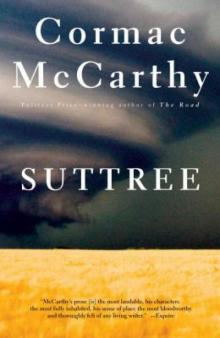 Suttree
Suttree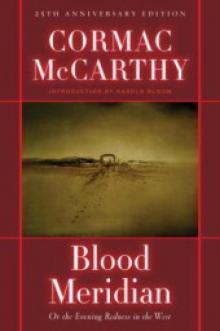 Blood Meridian, or the Evening Redness in the West
Blood Meridian, or the Evening Redness in the West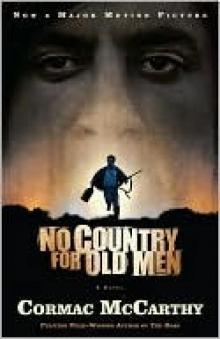 No Country for Old Men
No Country for Old Men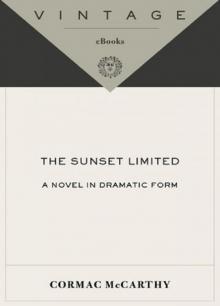 The Sunset Limited
The Sunset Limited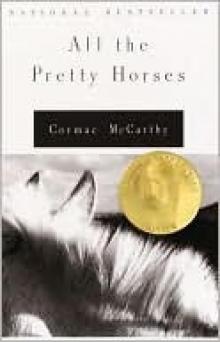 All the Pretty Horses
All the Pretty Horses The Crossing
The Crossing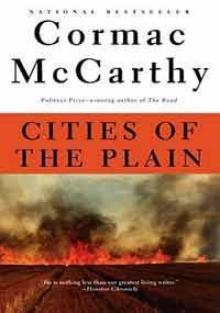 Cities of the Plain
Cities of the Plain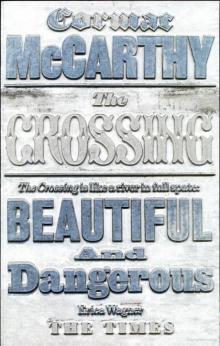 The Crossing tbt-2
The Crossing tbt-2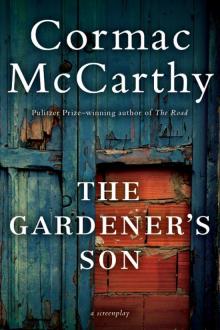 Gardener's Son
Gardener's Son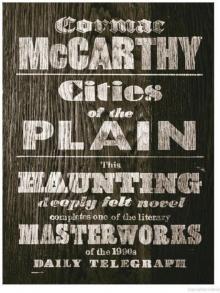 Cities of the Plain tbt-3
Cities of the Plain tbt-3 The Stonemason
The Stonemason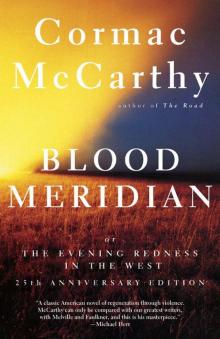 Blood Meridian: Or the Evening Redness in the West (Vintage International)
Blood Meridian: Or the Evening Redness in the West (Vintage International)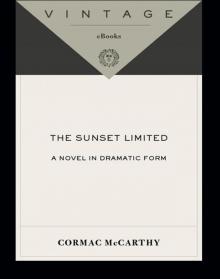 The Sunset Limited: A Novel in Dramatic Form
The Sunset Limited: A Novel in Dramatic Form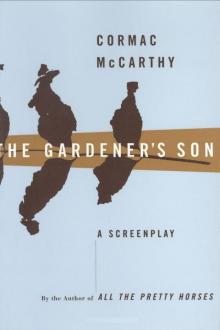 The Gardener's Son
The Gardener's Son